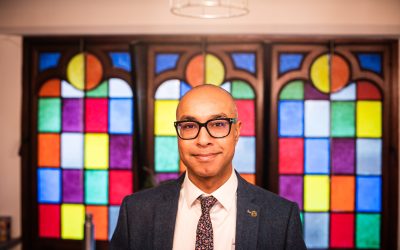Alan Donaldson, General Secretary of EBF, shares about both the growth and challenges from across Europe, and how our Scottish churches can play a significant role in God’s kingdom.
“The Lord gave me a picture of you and Ruth travelling together with just a few possessions, but joyfully serving the Lord.” These were the words of a trusted friend after sharing the news that we had decided it was time to pass on the baton of BUS leadership. The next two years became a time of patiently and impatiently waiting for God’s plan for our service to be revealed, and as it came into focus, so this picture came back to our minds.
In September, I was invited by the Baptist Unions, Associations and Networks of Europe, Central Asia and the Middle East to become the General Secretary of the European Baptist Federation (EBF).
The EBF was established in 1950 as a baptist contribution to reconciliation in Europe. It was committed to theological education, church planting where no baptist witness existed, and sending aid to areas that needed significant support. Over the years, these aims have continued but have taken different forms of expression.

Today, the EBF is a significant contributor to the work for freedom of religion and belief across the globe. Taking its place at the United Nations in Geneva, it regularly reports first-hand accounts of restrictions of religious liberty in Eastern Europe, Central Asia and the Middle East. As the iron curtain opened in the early 90’s, EBF immediately began to support the theological training of Eastern European leaders in many colleges across Europe, as well as in its own college in Switzerland, and later in Prague. This gave the resource of educated leaders who establish their own seminaries in their own nations.
Church planting is ongoing, with over 250 churches planted through the EBF mission partnership programme in the last 20 years. In 2022, the BUS will begin sponsoring a church planter in Ukraine for 5 years, alongside many other Unions and mission agencies in Europe and the Middle East which support our indigenous church planting model, mostly in Eastern Europe, Central Asia and the Middle East.
EBF’s commitment to mission and evangelism continues, with an annual conference and a new learning community where lessons that are being learned all over the world are shared and contextualised.
More recently, the EBF has realigned its programmes to explore the issues surrounding migration. Initially seeking to support those who were offering a welcome to refugees, this work continues to develop, and explores wider issues of justice, humanitarian aid and integration of the global church to the European church.
EBF also runs programmes for women, children and youth workers, and has a globally integrated relief programme which is currently focusing on Lebanon.
We would be delighted to partner with individual churches in Scotland who want to support church planting or give aid effectively in Europe. Please check us out at www.ebf.org where you can also check out the learning and development opportunities that exist for Scottish churches to connect and learn in a culturally diverse environment.
Finally, would you please commit to pray for Ruth and I as we seek to serve the purpose of God’s Kingdom in this growing region.



